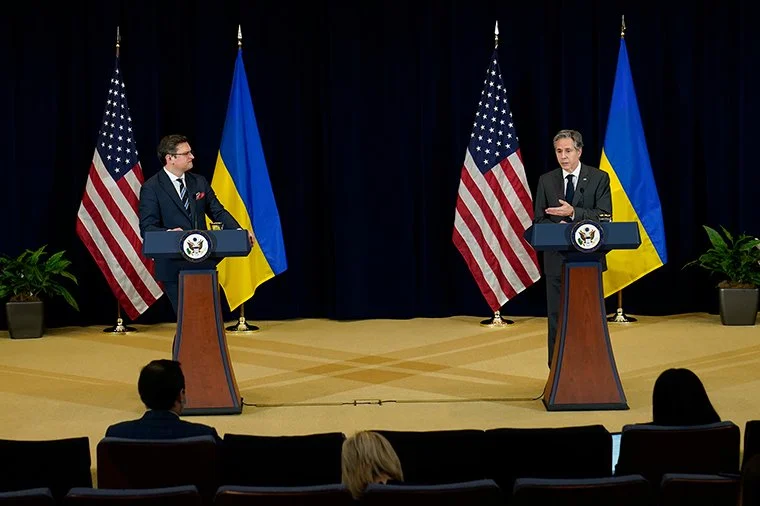OPINION: Russia-Ukraine imposition presents danger, a U.S. alliance is not worth the risk
“Secretary of State Antony Blinken, right, joined by Ukraine's Foreign Minister Dmytro Kuleba, speaks during a news conference at the State Department in Washington, Tuesday, Feb. 22, 2022.” Photo by Carolyn Kaster/Pool/AP.
Zach Donaldson is a freshman studying political science and an opinion writer for The New Political.
Please note that these views and opinions do not reflect those of The New Political.
Editor’s Note: This piece was written on Feb. 21, 2022, prior to Thursday’s invasion. It serves as a historical perspective based on the information provided at the time and presents an argument leading up to the crisis.
The West is more culpable than we are willing to admit, it’s time to reorient.
Imagine this: Beijing begins expanding its capabilities and spheres of influence westward, initiating talks of a formal military alliance with Canada and Mexico. What would you suggest the U.S. do: sit idly by and accept its southern and northern neighbors' "self-determination," or respond with firm and forceful measures?
If history tells us anything, the latter is to be expected. Whether it was the early establishment of the Monroe Doctrine or its swift and firm standoff over the Cuban Missile Crisis, America has always shown an interest in defending its shores and national security.
So, why are we surprised that Moscow would do the same?
I won't sympathize or diminish the legitimate tyranny perpetuated daily by Vladimir Putin and the Russian government. However, international relations are not a game of grandstanding and moral white knighting oriented around strategic goals and favorable outcomes. The facts of this case are relatively clear: the West's approach to the Russia-Ukraine crisis has knowingly provoked Moscow; it has been riddled in hypocritical foreign intervention. This strategy has little favorability for American or Ukrainian people. Our interests are better served in the mediation of Ukraine as a neutral buffer state which academic realists such as John Mearsheimer propose. We should shift our geopolitical focus towards the premier rising international threat: China.
Today's running narrative is that Putin's aggression is an unprovoked power grab, an attempt to reinstate former Soviet glory and stall Ukrainian self-determination, or in other words, the nation’s ability to determine its own systems of governance and political future. A look at history would suggest a more ambiguous count of events.
For starters, Ukraine is the direct western neighbor to Russia. What occurs in its borders are of far more strategic interest to Moscow than Washington. Since the immediate end of the Cold War and over the past 20 years, Russian diplomats and officials have warned that economic and military alliances with Ukraine would pose a direct security threat to Russia. Despite this, the U.S. and its allies have continued to poke the Russian bear, pushing NATO and the EU eastward.
As it relates to the domestic front, Ukraine is not a political monolith. The country's sizable ethnic Russian population has historically shown combating attitudes towards their international loyalties and has democratically elected Russian-sympathetic presidents. In fact, it was the coup d'etat of President Viktor Yanukovych in 2014 which precipitated the Russian annexation of Crimea. Furthermore, the U.S. has bankrolled political efforts to introduce western values and civil society through the National Endowment for Democracy and other organizations.
The idea that a Ukrainian-American alliance is being organically bred is not only flat-out wrong but dangerous. The risks posed to Eurasian stability by a Ukrainian allyship far outweigh any net benefits. Russia is a declining economic power. Its GDP and spheres of influence have been dwindling for the better part of the past two decades, and concerns of its re-emergence are more rooted in Cold-War nostalgia than practicality.
The U.S. interests today lie in the Persian Gulf and combating the rising threat of China. It would be most beneficial for all parties involved to sit down at the negotiating table, establish Ukraine as a neutral buffer state and refocus geopolitical efforts towards more pressing matters: efforts in which Washington may need Moscow as a critical balancer.

